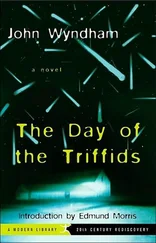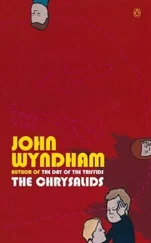John Wyndham - The Midwich Cuckoos
Здесь есть возможность читать онлайн «John Wyndham - The Midwich Cuckoos» весь текст электронной книги совершенно бесплатно (целиком полную версию без сокращений). В некоторых случаях можно слушать аудио, скачать через торрент в формате fb2 и присутствует краткое содержание. Жанр: Фантастика и фэнтези, на английском языке. Описание произведения, (предисловие) а так же отзывы посетителей доступны на портале библиотеки ЛибКат.
- Название:The Midwich Cuckoos
- Автор:
- Жанр:
- Год:неизвестен
- ISBN:нет данных
- Рейтинг книги:4 / 5. Голосов: 2
-
Избранное:Добавить в избранное
- Отзывы:
-
Ваша оценка:
- 80
- 1
- 2
- 3
- 4
- 5
The Midwich Cuckoos: краткое содержание, описание и аннотация
Предлагаем к чтению аннотацию, описание, краткое содержание или предисловие (зависит от того, что написал сам автор книги «The Midwich Cuckoos»). Если вы не нашли необходимую информацию о книге — напишите в комментариях, мы постараемся отыскать её.
The Midwich Cuckoos — читать онлайн бесплатно полную книгу (весь текст) целиком
Ниже представлен текст книги, разбитый по страницам. Система сохранения места последней прочитанной страницы, позволяет с удобством читать онлайн бесплатно книгу «The Midwich Cuckoos», без необходимости каждый раз заново искать на чём Вы остановились. Поставьте закладку, и сможете в любой момент перейти на страницу, на которой закончили чтение.
Интервал:
Закладка:
Young Tom Dorry returned home on leave from the navy after eighteen months' foreign service. When he learned of his wife's condition, he picked up his traps and went over to his mother's cottage. But she told him to go back and stand by the girl because she was frightened. And when that didn't move him, she told him that she herself, respectable widow for years was – well, not exactly frightened, but she couldn't for the life of her say how it had happened. In a bemused state Tom Dorry did go back. He found his wife lying on the kitchen floor, with an empty aspirin bottle beside her, and he pelted for the doctor.
One not– so-young woman suddenly bought a bicycle, and pedalled it madly for astonishing distances, with fierce determination.
Two young women collapsed in over-hot baths.
Three inexplicably tripped, and fell downstairs.
A number suffered from unusual gastric upsets.
Even Miss Ogle, at the post office, was observed eating a curious meal which involved bloater-paste spread half an inch thick, and about half a pound of pickled gherkins.
A point was reached when Dr Willers' mounting anxiety drove him into urgent conference with Mr Leebody at the Vicarage, and, as if to underline the need for action, their talk was terminated by a caller in agitated need of the doctor.
It turned out less badly than it might have done. Luckily the word 'poison' appeared on the disinfectant bottle in conformity with regulations, and was not to be taken as literally as Rosie Platch had thought. But that did not alter the tragic intention. When he had finished, Dr Willers was trembling with an impotent, targetless anger. Poor little Rosie Platch was only seventeen...
Chapter 8. Heads Together
The tranquillity that Gordon Zellaby had been pleasantly regaining after the wedding of Alan and Ferrelyn two days before, was dissipated by the irruption of Dr Willers. The doctor, still upset by the near-tragedy of Rosie Platch, was in an agitated state which gave Zellaby some difficulty in grasping his purpose.
By stages, however, he discovered that the doctor and the vicar had agreed to ask for his help – or, more importantly, it seemed, Angela's help – over something that was far from clear, and that the misadventure to the Platch child had brought Willers on his mission earlier than he had intended.
'So far we've been lucky,' Willers said, 'but this is the second attempted suicide, in a week. At any moment there may be another; perhaps a successful one. We must get this thing out in the open, and relieve the tension. We cannot afford any more delay.'
'As far as I am concerned, it is certainly not in the open. What thing is this?' inquired Zellaby.
Willers stared at him for a moment, and then rubbed his forehead.
'Sorry,' he said. 'I've been so wound up with it lately; I forgot you mightn't know. It's all these inexplicable pregnancies.'
'Inexplicable?' Zellaby raised his eyebrows.
Willers did his best to explain why they were inexplicable.
'The whole thing is so incomprehensible,' he concluded, 'that the vicar and I have been driven back on to the theory that it must in some way be connected with the other incomprehensible thing we have had here – the Dayout.'
Zellaby regarded him thoughtfully for several moments. One thing about which there could be no doubt at all was the genuineness of the doctor's anxiety.
'It seems a curious theory,' he suggested, cautiously.
'It's a more than curious situation,' replied Willers. 'However, that can wait. What can't wait is a lot of women who are on the verge of hysteria. Some of them are my patients, more of them are going to be, and unless this state of tension is resolved quickly -' He left the sentence unfinished, with a shake of his head.
' "A lot of women"?' Zellaby repeated. 'Somewhat vague. How many?'
'I can't say for certain,' Willers admitted.
'Well, in round figures? We need some idea of what we have to deal with.'
'I should say – oh, about sixty-five to seventy.'
' What! ' Zellaby stared at him, incredulously.
'I told you it is the devil of a problem.'
'But, if you're not sure, why pitch on sixty-five?'
'Because that's my estimate – it's a pretty rough estimate, I admit – but I think you'll find it's about the number of women of childbearing age in the village,' Willers told him.
Later that evening, after Angela Zellaby, looking tired and shocked, had gone to bed, Willers said:
'I'm very sorry to have had to inflict this, Zellaby – but she would have had to know soon, in any case. My hope is that the others can take it only half as staunchly as your wife has.'
Zellaby gave a sombre nod.
'She is grand, isn't she? I wonder how you or I would have stood up to a shock like that?'
'It's a hell of a thing,' Willers agreed. 'So far, most of the married women will have been easy in their minds, but now, in order to stop the unmarried going neurotic, we've got to upset them, too. But there's no way round that, that I can see.'
'One thing that has been worrying me all the evening is how much we ought to tell them,' Zellaby said. 'Should we leave the thing a mystery, and let them draw conclusions eventually for themselves – or is there a better way?'
'Well, damn it, it is a mystery, isn't it?' the doctor pointed out.
'The how is a very mysterious mystery,' Zellaby admitted. 'But I don't think there can be much doubt as to what has happened. Nor, I imagine, do you – unless you're deliberately trying to avoid it.'
'You tell me,' suggested Willers. 'Your line of reasoning may be different. I hope it is.'
Zellaby shook his head.
'The conclusion -' he began, and then suddenly broke off, staring at the picture of his daughter.
'My God!' he exclaimed. 'Ferrelyn, too...?'
He turned his head slowly towards the doctor. 'I suppose the answer is that you just don't know?'
Willers hesitated.
'I can't be sure,' he said.
Zellaby pushed back his white hair, and lapsed back in his chair. He remained staring at the pattern of the carpet for a full minute, in silence. Then he roused himself. With a studied detachment of manner, he observed:
'There are three – no, perhaps four – possibilities that suggest themselves. You would, I think, have mentioned it had there been any evidence of the explanation that will at once occur to the more obvious-minded? Besides, there are other points against that which I shall come to shortly.'
'Quite so,' agreed the doctor.
Zellaby nodded. 'Then, it is possible, is it not, in some of the lower forms at any rate, to induce parthenogenesis?'
'But not, as far as is known, among any of the higher forms – certainly not among mammals.'
'Quite. Well then, there is artificial insemination.'
'There is,' admitted the doctor.
'But you don't think so.'
'I don't.'
'Nor do I. And that,' Zellaby went on, a little grimly, 'leaves the possibility of implantation, which could result in what someone – Huxley, I fancy – has called "xenogenesis". That is, the production of a form that could be unlike that of the parent – or, should one perhaps say, "host"? – It would not be the true parent.'
Dr Willers frowned.
I've been hoping that that might not occur to them,' he said.
Zellaby shook his head.
'A hope, my dear fellow, that you would do better to abandon. It may not occur to them straight away, but it is the explanation – if that is not too definite a word – that the intelligent ones are bound to arrive at before long. For, look here. We can agree, can we not, to dismiss parthenogenesis? – there has never been a reliably documented case?'
Читать дальшеИнтервал:
Закладка:
Похожие книги на «The Midwich Cuckoos»
Представляем Вашему вниманию похожие книги на «The Midwich Cuckoos» списком для выбора. Мы отобрали схожую по названию и смыслу литературу в надежде предоставить читателям больше вариантов отыскать новые, интересные, ещё непрочитанные произведения.
Обсуждение, отзывы о книге «The Midwich Cuckoos» и просто собственные мнения читателей. Оставьте ваши комментарии, напишите, что Вы думаете о произведении, его смысле или главных героях. Укажите что конкретно понравилось, а что нет, и почему Вы так считаете.












